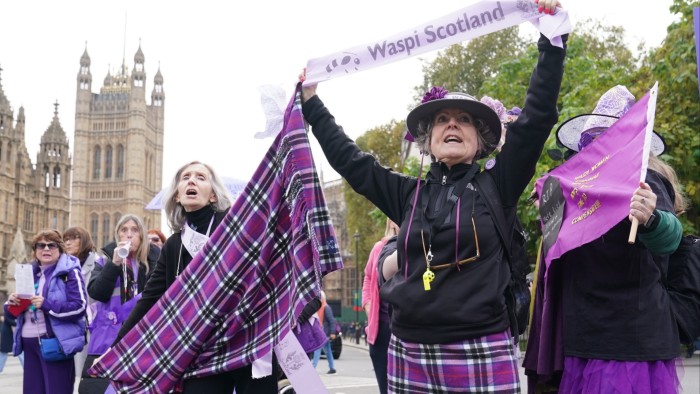UK rules out compensation for women affected by state pension age changes

Unlock the Editor’s Digest for free
Roula Khalaf, Editor of the FT, selects her favourite stories in this weekly newsletter.
UK ministers have ruled out compensation of as much as £10.5bn for up to 3.8mn women born in the 1950s who claim they lost thousands of pounds after not being properly informed of changes to the state pension age.
Work and pensions secretary Liz Kendall said there should be “no scheme of financial compensation” for so-called Waspi women, rejecting a report by the Parliamentary and Health Service Ombudsman that this year called for compensation of between £1,000 and £2,950 for every person affected.
Kendall told MPs on Tuesday that most women knew the state pension age was due to rise gradually from 1995 and that the impacts of delays to letters alerting women to the change in the state pension age were not as significant as the Ombudsman said.
“Given the vast majority of women knew the state pension age was increasing, the government does not believe paying a flat rate to all women at a cost of up to £10.5bn would be fair or proportionate to taxpayers,” Kendall said.
While the decision had been “extremely difficult”, Kendall said it was “the right course of action and we are determined to learn all the lessons to ensure this type of maladministration never happens again”.
But Angela Madden, chair of the Women Against State Pension Inequality (Waspi) campaign, said Kendall’s was “a bizarre and totally unjustified move which will leave everyone asking what the point of an ombudsman is if ministers can simply ignore their decisions”.
“An overwhelming majority of MPs back Waspi’s calls for fair compensation and all options remain on the table. If the government cannot act to put things right, parliament must now seek an alternative mechanism to force this issue on to the order paper so justice can be done,” she added.

In March, the Parliamentary Service and Health Ombudsman called for compensation for thousands of women born between April 1950 and April 1955 who had “suffered injustice” because of administration errors by the Department for Work and Pensions.
From the 1940s until April 2010, the UK’s state pension age (SPA) was 60 for women and 65 for men. In 1995 new legislation set out a timetable to increase women’s pension age gradually from 60 to 65 between 2010 and 2020 to make them equal.
In 2010, the Conservative-Liberal Democrat coalition government brought forward the deadline for the equalisation of the SPA to November 2018, about two years faster than originally scheduled. In the same piece of legislation, it also raised the SPA for men and women to 66.
The report by the ombudsman, which probes complaints against government departments, found thousands of women “may have been affected” by DWP’s failure to inform them properly that the state pension age had changed.
The ombudsman estimated the compensation bill could be between £3.5bn and £10.5bn, although it said it understood not all women affected by the change — estimated by a parliamentary committee to be as many as 3.8mn — would have “suffered injustice”.
When the report was released, the then Conservative government said it would consider the report and respond in due course.
Steve Darling, Lib Dem work and pensions spokesperson, said the decision marked a “day of shame for the government”, which had “turned it back on millions of pension-age women who were wronged through no fault of their own”.
Kendall’s move marked a break with Labour party policy under former leader Jeremy Corbyn, who vowed in 2018 to compensate all Waspi women in a scheme costing about £58bn.
Sir Steve Webb, former Lib Dem pensions minister, said the government’s decision set “an extremely worrying” precedent.
“If it is acceptable for a department to completely reject the findings of a report by the independent parliamentary ombudsman, this strikes a blow at the heart of the whole process,” he said.
#rules #compensation #women #affected #state #pension #age





